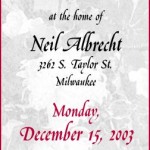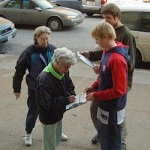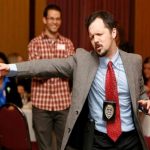“Legacy, Schmegacy”
On December 29, 2003, John O. Norquist was busy cleaning up the office he had occupied for nearly sixteen years as mayor of Wisconsin’s largest city. His high-ceilinged suite on the south end of the second floor of city hall is one of the few rooms in that historic building that had not been renovated during his tenure. The room is flatly paneled in 1964 era wood, a stark contrast to the filigreed exterior and interior of most of City Hall. His predecessor, Henry W. Maier, had already been four years in office when the room took on its present aspect, with just a few utilitarian chairs, built in bookshelves, a large desk, and a matching armoire. “These are Henry’s towels,” he says, pulling some fluffy white hand towels out of the armoire. By January 2nd, they will be Marvin Pratt’s towels. There won’t be much else remaining after he’s done packing, Norquist says. Just a couple of railroad posters from the ‘20’s, a photograph of Frank Zeidler and Carl Baehr’s history of Milwaukee street names.
The office is not exactly cluttered with trinkets of the sort bestowed on heads of government, but only because it is a large office. No doubt, the trinkets have definitely accumulated over the years, tossed on the shelves by Norquist after groundbreakings, official visits, and other events during the course of a political life.
Milwaukee’s mayors are not in the habit of leaving office – Norquist is only the city’s sixth since World War I – so it is understandable that it is not easy for him to figure out where to begin.
Norquist reaches for a small bronze sculpture that he easily removes from its place on a high shelf. “See this? It is something I got.” The artifact is Italian, he remembers, and it is safe to say that it is not from the hand of a Renaissance master. He places it in a box that will go to the Milwaukee County Historical Society.
Next up is another trinket. “It’s from the Lakeshore Fishermen. I’m proud, but I don’t want an award wall.” He chucks it into the historical society box. He pulls out a book, in Italian, with photographs of Parma. “Do I want to carry this everywhere I go?” To the library, then. Another book, in Finnish. “Well this one is on architecture in Finland. I’ll keep it.” Next is a book on Milwaukee sculptures, signed by its author, Diane Buck. “I’ve got to keep it.”
A memento from the International Association of Women Police Officers stumps the mayor until a visitor suggests he could send it in the interoffice mail to new chief Nannette Hegerty.
The mayor is reaching his stride. Several trowels from long-forgotten cornerstone layings are Historical Society bound. “Warner Cable Hang Tough Video Contest, June 5 1992,” is a five-pointed plexiglass star. “This award is a weapon,” he jokes, pretending to throw it, martial arts style. The visitor, troubled by flying papers at his office desk, could use a few paperweights, so he gets that one, along with “America’s Black Holocaust Museum Grand Opening Celebration, May 15, 1999;” “Atlanta 1996” (“What’s this for? Oh, yes. The Olympics”); a metal, undated hockey-puck kind of paperweight (“probably been here since the Hoan administration”); and a formidable crystal with the U.S. seal on it, and further decorated with “Herb Kohl U.S.S. January 3, 1989.”
A mayor sure gets a lot of things from potentates. “Well, some were potent, and some were impotent,” Norquist jokes.
The mayor has laid in a large store of plastic-framed photographs of the Calatrava addition, and he sits down to autograph one for the visitor. The visit had been planned a week or so before. The idea was that the mayor could do a sort of exit interview, just talking about the things that mattered to him over the years, and the things that didn’t matter quite so much. The decisions he made to take action, and, by his measurement, the many more decisions he made to take no action.
“Legacy, schmegacy,” he wrote in a message before the visit. Legacy is just another trinket to go into a box.
The mayor, when asked, does not remember a particular trinket with his own name on it – there have been several during his long tenure – and he can’t recall where the first brass plaque with his name on it was mounted. [It is placed on the west wall of the Milwaukee Repertory Theater Power plant building, along a stretch of riverwalk he dedicated in 1988, his first year in office. (The other name on the plaque: Tommy Thompson.)] “I don’t remember that,” Norquist says, but the Riverwalk – the plan for the Riverwalk, at least – “is in place from the mouth of the river,” all the way up to the former dam. Norquist for sure played a role in the Riverwalk plans. “And I definitely played a role in killing the Park East Freeway.” What about East Pointe Commons, the development that took the place of much of the unbuilt (but cleared) portion of the proposed roadway? That was one of Norquist’s first groundbreakings. “Actually, the plans for redevelopment were in place during the previous administration. But we challenged a six foot fence they wanted to build around it – to make the suburbanites feel safe, I suppose. So we urbanized it a little bit. It was Peter Park’s first triumph.”
Norquist saw to it that Lakefront Brewery had a chance to purchase a City Forestry building that is now its home, saying “the less real estate the city owns the more beautiful it gets. When the government owns land too long, it gets ugly.” Tax exempt property is ugly; taxable real estate is pretty. Norquist looks out the window at a block of 19th century buildings just south of city hall on the west side of N. Water Street. In the early 1990’s the Milwaukee Sentinel editorialized that the buildings should be torn down. Condos and restaurants now are located there. Norquist says inaction saved the block. It is a theme of his.
“The paper always editorialized about leadership. Well, by not showing leadership, I saved the block. I wasn’t the typical cheerleader. I showed leadership by not enthusiastically embracing the ball park plan, by not immediately throwing gobs of money at the convention center, by not doing whatever Bo Black wanted for her free rent at Summerfest, by not doing whatever Carl Mueller’s clients wanted me to do; with the Sixth Street Viaduct I didn’t immediately offer to pay for the bridge. I did a lot by not showing leadership.”
The dividing line between action and inaction, he says is that public projects – like freeway demolitions or riverwalk access, or zoning codes – are properly within the scope of a mayor’s job. Messing around with private investments, offering subsidies and other breaks can be dangerous, he says. “Right after I was first elected, [then-Alderman Paul] Henningsen wanted me to chase the Commission Row people [produce merchants] out of the Third Ward, and to develop the area. We would have wound up with schlock condos. You can push public amenities, but it is risky to push the private people and to capitalize private housing – you wind up with crummy designs.”
The Park East Freeway redevelopment is a concern right now. Norquist opposes plans for a Community Benefits Agreement to guide redevelopment of the demised freeway corridor. “If they Sovietize the Park East, no developers will show up, especially the smaller ones with no connections. All you will get are guys with their hands out for a subsidy. The kicker is, with subsidized development, you never find out what the real market is, so the taxpayers get screwed.”
Norquist figures that his unsubsidized city is making some developers think twice about projects out in the hinterlands, such as Oconomowoc. “Look at Pabst Farms. It was supposed to be 1,400 units, and now they are talking about only 900 units” of upscale housing. The implication is that Milwaukee is capturing upscale housing that was once considered the birthright of suburbia – and exurbia.
Then, quite without warning, Norquist makes the following, rather personal statement:
“Getting rid of Ron Pleva [as head of the Board of Zoning Appeals] was a big plus. He slowed the permit process down. I put [Craig] Zetley in there instead. He didn’t have a conflict of interest. He wasn’t a zoning attorney.” (Pleva, later told of Norquist’s comments, disputed that he slowed down the permit process, and said that he worked under the law as it was at the time, and that he had indeed done a good job. His words for Norquist, [edited for profanity by the use of asterisks]: “You can tell that asterisked asterisking asterisker that he can go to Hell!”)
It’s Not Hell, It’s Chicago
Norquist’s immediate plan is not to go to Hell, but to Chicago, where the climate is less predictable. He will be president and CEO of the Congress For The New Urbanism, a planning group that will move its operations headquarters to Chicago while its research wing will remain in San Francisco, where it was founded. [Wife Susan Mudd is a fellow board member of the organization] The CNU offices are still under construction in the Loop, in the Marquette Building, at Adams and Van Buren. A Helmut Jahn building is next door. The landlord, and fellow tenant, is the MacArthur Foundation, famous for its genius grants.. What exactly is the focus of CNU? Will it be Norquist’s job to sell New Urbanism to mayors and politicians across the country, in places like Schenectady, New York, which Norquist calls “the Flint, Michigan of New York State”? (This is not a compliment.)
“There was an article in the New York Times today, about Schenectady,” Norquist says. “It is falling apart. It has suburban-type zoning overlays. In Schenectady, everything is wrong.”
“What is my job? You mean, what am I going to do other than sit at a desk and pontificate? I am going to communicate through developers, architects, economists and universities the message that urban form adds more value, particularly more value per acre.”
“Developers, architects, economists and universities.” Not a word about politicians. Politicians are not the go-to people when you want to get something done, apparently.
Norquist returns to his office clearing. “What the hell is this? The West Side Marketplace Grand Opening. Look at this junk.”
Then, upon reflection, “well, it’s not bad as far as strip malls go. Off to the Historical Society.”
The visitor shows a campaign button that he had brought to the visit. “Save Milwaukee. Bork Norq.” It dates to 1992, and was circulated by Lud Menzl, a towing potentate who lost his contract early in the Norquist administration. Menzl handed out the button at the former 5 & 10 Bar, then owned by former Milwaukee Police Department homicide detective Bill Vogl.
“What was his name – his first name – Vogl – Bill Vogl, that’s it. If Vogl had run, instead of [Fire Department Union head] Greg Gracz, he could have beat me. He’s the one guy of all of them who could have beat me.”
Pratt Takes Charge: The Acting Mayor Acts; the first change in administration in 16 years.
“You didn’t have to do it, but you did, but you did, but you did. And I thank you.” – from the inaugural address of Acting Mayor Marvin Pratt.
Common Council President Marvin Pratt has lost his vote on the council, but that is a small price to pay in exchange for his new job as acting mayor of the city of Milwaukee – at least until the general election. Pratt gained the seat and the “acting” prefix due to his role as President of the Common Council, a position for which he was unanimously chosen by his colleagues in 2000. With the early resignation of John O. Norquist, Pratt takes on the helm of the city, doing whatever he can to steer the ship of state, and to bring some electors to what will certainly not be a unanimous vote this spring. He also gets to stay as president of the Common Council; he just can’t cast a vote anymore. Pratt, who, as Common Council President, called for religious leaders to open council sessions with a prayer, began his inaugural address with this quote: “What a beautiful day the Lord has made. Let us rejoice and be glad in it.” Jesus, it was quite an inauguration.
His address relied on a rhetorical device reminiscent of Rev. Martin Luther King’s “I Have a Dream” speech.
And to pray.
Pratt’s first official act?
“I will sign a proclamation as my first official act. That proclamation will be addressed to the leaders of MICAH – The Milwaukee Inner Congregations Allied for Hope – and to all the other religious leaders in the Greater Milwaukee Area. … It will proclaim this day as ‘Unity Day,’ alternatively ‘Marvin Pratt Day’”. (Applause and Laughter.)
Pratt went on to announce his initiatives for an interim mayoralty that is likely to be as much a caretaker government as a bully pulpit for his election.
“First, we will hold a job fair right here in City Hall. … Second, I will hold the first citywide town hall meeting in years, again right here in City Hall,” warning that all department heads, staff, and he will be present to “listen to the citizens of Milwaukee. All are welcome to come, to ask questions, to air grievances and to make suggestions.”
(What has this man got himself into? This is like a casting call for cranks.) “Third, I will be asking city workers to look at helping our educational system by agreeing to mentor one student,” in the H.O.S.T.S. program. [Helping One Student To Succeed.]
“And fourth, I will put forth a drivers license workforce development program to remove a barrier to people able to be employed [but driving without a license, or with a suspended one.]
In what could be interpreted as a slight against the outgoing administration, if not opponent Tom Barrett, Pratt offered a comment on the educational system. “Let me say loudly and clearly here today, I have no design as mayor to take over the school system. … We will continue to invite the school board and the superintendent to speak to us and to work with us, but we won’t be telling them what to do.”
In summation, Pratt invoked a higher power than even the school superintendent as he prayed for more than a mere caretaker’s role: “It will be a long road. But it is that long road that has brought me here. From my days as an intern in then-mayor Henry Maier’s office, to alderman of the first district to common council president to today, Mayor of the City of Milwaukee, I have traveled that long road. And I know that: ‘nobody told me the road would be easy. I don’t believe he brought me this far to leave me. … Thank you all for coming and God Bless everyone.”
Norquist Pension Details Revealed
According to Anne M. Bahr, the Executive Director of the city’s Employes’ Retirement System (ERS), Norquist has been a member since April 19, 1988. “Normal service retirement age for general city and an elected official is age 60. Mr. Norquist will turn age 60 on October 22, 2009.” That’s a long way, off, but Norquist will turn 55 on October 22, 2004 (this year) and could choose to retire under early retirement provisions. If he chose to do so, his estimated monthly pension would be $2,732 and he would also receive a Global Pension Settlement Lump sum bonus of approximately $14,800. The pension could be reduced if he chose a survivorship option, and the survivor elected. (Let’s hope it’s Susan Mudd.) If Norquist were to wait until 2009 (we’ll know soon enough), his estimated pension would be approximately $3,906 per month, plus a bonus of approximately $23,000. He probably also has a legislative pension due him, too.
Pension issues may also affect the plans of mayoral candidates including Vince Bobot (police officer, city attorney, municipal judge), Acting Mayor Pratt and Alderman Tom Nardelli, all of whom will be out of a job if not elected mayor.
THE BATTLE FOR THE GAY VOTE
Last week, we mentioned that Sandy Folaron was apparently the first mayoral candidate to hold a fundraiser for the gay community. The accompanying invitation, provided by the Barrett campaign, shows that his fundraiser was held earlier, on December 15th.
ROCK THE VOTE (BUT NOT THE CRADLE)
City Hall during property tax season was a popular place for candidates to gather signatures, as was mentioned here last week. A captive audience of public minded citizens eager to save the cost of a postage stamp is a politician’s delight. Along comes County Executive candidate Joe Klein who was miffed to see these apparent juveniles circulating nomination papers for David Riemer. Decide for yourself if the children’s political activism represents “corrupt and seedy practices,” as Klein states, but the law declares “circulators of nomination papers or election-related petitions are required to be United States citizens, Age 18 or older (on the date of circulation.)” (Photo by Kent Mueller.)
Fourth Street Forum Schedule, January 2004
January 8th
Panelists: Jim Carpenter, Lecturer, Economics Dept., MATC and former Green Party candidate; Alberta Darling, State Senator; Barbara Lawton, Lt. Governor; and Ed Thompson, Chair, Libertarian Party of WI
Moderator:Jack Murtaugh, Co-Chair, 4th Street Forum Executive Committee
January 15th
Panelists: Bob Barr, JD, former U.S. Congressman & 21st Century Liberties Chair for Freedom & Privacy, American Conservative Union; Steven M. Biskupic, JD, U.S. Attorney, Eastern Dist. of WI; David Mitchell, Special Agent, FBI; and Nadine Strossen, JD, President, ACLU and Constitutional Law Professor, NY Law School
Moderator:Jack Murtaugh, Co-Chair, 4th Street Forum Executive Committee
January 22nd
Panelists: Kathleen A. Dolan, PhD, Associate Professor, Political Science Dept., UWM; Gladys Gonz·lez, Director, Lawyer Referral & Information Service, Milwaukee Bar Assoc; Todd Robert Murphy, President, Todd Robert Murphy Advertising & Public Relations; and Rev. Rolen Womack, Minister, Progressive Baptist Church
Moderator: E. Marie Broussard, 4th Street Forum Executive Committee Member
January 29th
Panelists: Sheila Cochran, Secretary Treasurer, Milwaukee County Labor Council; Curtiss E. Harris, Sr. Partner, Advantage Business Partners; Barry R. Mandel, President, Mandel Group; and Julia Taylor, President, Greater Milwaukee Committee
Moderator: Julilly Kohler, JD, Co-Chair, 4th Street Forum Executive Committee
When: Both Forums are from noon to 1:00 p.m., which Milwaukee Public Television (MPTV) tapes for later broadcast. (See below for the broadcast schedule.) If you can spare the time, stay for an additional 30 minutes of question and answer with the panelists.
Where: Milwaukee Turners Hall, 1034 N. 4th Street (2nd floor)
Note: Forums are free and open to the public. Bring your own lunch or purchase it from the Historic Turners Restaurant. MPTV Channel 10/36 broadcasts the afternoon forums on Channel 10, Friday at 10 p.m. and again on Channel 36, Sunday at 3 p.m.
Questions? Call (414-272-2833) or email martindock@aol.com
Deidre A. Martin, Program Director of 4th Street Forum.
4th Street Forum is a program of the Milwaukee Turners with co-sponsors, Milwaukee Public Television and UWM Milwaukee Idea and the Center for Urban Initiative and Research. 4th Street Forum is dedicated to promoting a healthy democracy through open and substantive public discussion.
Political Contributions Tracker
Displaying political contributions between people mentioned in this story. Learn more.
- November 13, 2017 - Tom Barrett received $100 from Carl Mueller
- September 14, 2017 - Tom Barrett received $50 from Vincent Bobot
- March 30, 2016 - Tom Barrett received $100 from Carl Mueller
- March 30, 2016 - Tom Barrett received $500 from Craig Zetley
- March 9, 2016 - Tom Barrett received $100 from Carl Mueller
- November 11, 2015 - Tom Barrett received $100 from Carl Mueller
- November 2, 2015 - Tom Barrett received $130 from Carl Mueller
- November 2, 2015 - Tom Barrett received $1,000 from Carl Mueller
Plenty of Horne
-
Milwaukee Modernism Gains National Awards
 Dec 15th, 2025 by Michael Horne
Dec 15th, 2025 by Michael Horne
-
New Rainbow Crosswalks Mark Milwaukee’s LGBTQ+ History
 Oct 8th, 2025 by Michael Horne
Oct 8th, 2025 by Michael Horne
-
Welcome Back, Tripoli Country Club!
 May 27th, 2025 by Michael Horne
May 27th, 2025 by Michael Horne
The Roundup
-
Conservative Power Rises in Senate
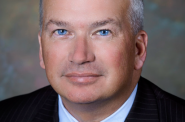 May 18th, 2015 by Steven Walters
May 18th, 2015 by Steven Walters
-
Buffett Tour on Hold
 Jun 27th, 2005 by Michael Horne
Jun 27th, 2005 by Michael Horne
-
Museum’s Wish List
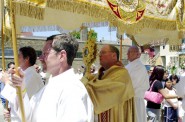 Jun 20th, 2005 by Michael Horne
Jun 20th, 2005 by Michael Horne


